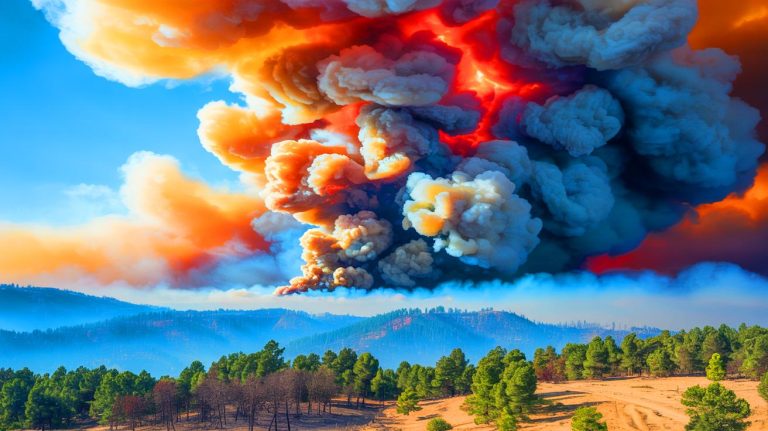| IN A NUTSHELL |
|
Climate change is an invisible threat that is increasingly manifesting itself in devastating ways. One of the most alarming impacts is its role in fueling wildfires, which silently claim lives and result in massive economic losses. A recent study led by Oregon State University (OSU) has uncovered that wildfires, exacerbated by human-induced climate change, have been responsible for approximately 15,000 deaths and $160 billion in economic damages across the United States from 2006 to 2020. This article delves into the findings of this study, exploring the hidden death toll of wildfire smoke, the reversal of progress in air quality, and the urgent need for policy interventions.
Smoke’s Hidden Death Toll
Wildfire smoke contains fine particulate matter, commonly referred to as PM 2.5. These microscopic pollutants can penetrate deep into the lungs, posing severe health risks. Short-term exposure to PM 2.5 can cause irritation of the eyes and throat, while prolonged exposure is linked to chronic illnesses and premature death. Vulnerable groups, including children, the elderly, outdoor workers, and pregnant individuals, are especially at risk. The study revealed that exposure to PM2.5 is a known contributor to cardiovascular diseases and respiratory illnesses.
Bev Law, professor emerita at OSU’s College of Forestry and the study’s lead author, emphasized the dire consequences of climate change on wildfire severity. The researchers conducted a comparative analysis using real-world weather data and modeled scenarios without human-induced climate change. This approach helped isolate the climate-driven factors increasing wildfire severity. They found that climate change has significantly expanded forest fire extents and accelerated daily fire growth rates, leading to a higher death toll associated with wildfire smoke.
Air Quality Progress Reversed?
The study’s findings are stark: out of the 164,000 deaths associated with wildfire smoke over a 15-year period, approximately 15,000 can be attributed directly to climate change. Certain areas in the Western United States experienced mortality rates up to 50% higher than others, highlighting the unequal and increasing burden of a warming climate. Wildfires have emerged as a dominant source of air pollution, contributing nearly half of all PM2.5 emissions in the U.S., effectively negating decades of progress in air quality improvements.
The researchers warned of a grim future if greenhouse gas emissions are not curbed. Without intervention, the frequency and intensity of wildfires, along with the associated fine particulate matter, will continue to rise. Projections indicate a potential 50% increase in mortality rates from wildfire smoke by the middle of the century, with annual economic damages reaching $244 billion. The findings underscore the urgent need for comprehensive measures to address climate change and enhance public health interventions.
The Economic Impact of Wildfires
Beyond the health implications, wildfires have a profound economic impact. The study estimates that climate change-induced wildfires have resulted in $160 billion in economic losses over the 15-year study period. This figure encompasses various sectors, including agriculture, infrastructure, and healthcare. The destruction of property, loss of crops, and increased healthcare costs contribute significantly to the overall economic burden.
Table: Key Economic Impacts of Wildfires
| Sector | Economic Losses (in billion USD) |
|---|---|
| Agriculture | 30 |
| Infrastructure | 45 |
| Healthcare | 85 |
The economic ramifications are expected to worsen unless effective climate policies are implemented. The study calls for investment in sustainable practices, improved wildfire management, and robust health systems to mitigate the impacts of future wildfires.
The Path Forward
The findings of the OSU study serve as a critical wake-up call for governments, policymakers, and individuals. Addressing the root causes of climate change is imperative to prevent further loss of life and economic damage. The study advocates for the reduction of greenhouse gas emissions, adoption of cleaner energy sources, and implementation of proactive public health measures to shield vulnerable populations from the health impacts of wildfire smoke.
Moreover, raising awareness about the dangers of wildfire smoke and promoting community resilience through education and resource allocation are essential steps. Collaborative efforts at the local, national, and international levels are crucial to developing effective strategies that balance environmental sustainability with economic growth. As we confront the challenges of a changing climate, the question remains: How will society rise to the occasion to safeguard our future?
Did you like it? 4.5/5 (24)










Wow, 15,000 deaths? That’s more than I expected. 😮
Is there any way to filter PM 2.5 from the air in our homes?
Great article! It’s alarming to see how climate change is affecting us so drastically.
Can someone explain how they calculated the $160 billion economic hit?